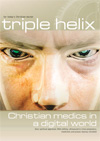Being engaged but morally distinctive
We are now living in a post- Christian society and working in a post-Christian health service. But how are we to live in such a context? It's precisely for this kind of situation that the story of the prophet Daniel is so instructive. When Jerusalem fell to the Babylonians in 587 BC, the nation of Judah was taken to Babylon in an exile that would last 70 years. As God's people in a foreign land that was hostile to their faith and values, they faced the challenge of living and serving as 'aliens and strangers'. There was great pressure to close ranks or to forget who they were. There was also great handwringing and lament. (1)
The Jews were forcibly displaced people - not even asylum seekers or refugees let alone economic migrants - but rather captives - prisoners of war in a country utterly different from their own in language, culture, values, religion and worldview. God's people - but made to serve in a godless empire, Babylon.
The apostle Peter also writes of 'living in Babylon' and describes God's elect (Christians) as 'strangers in the world' (2) and 'aliens'. (3) He calls his readers to 'be holy' - set apart - because they are 'a chosen people, a royal priesthood' and 'a holy nation'. (4)
The situation faced by Daniel and his friends in ancient Babylon was not dissimilar to ours as Christian doctors in twenty-first century Britain. In Babylon they were aliens, exiles, sojourners, strangers - awaiting the coming of their real kingdom when they would return to Jerusalem - just as we are waiting to be taken to our 'New Jerusalem' with Christ. (5)
In this situation of tension they faced two temptations. The first was to retreat into an escapist spiritual ghetto - to seek solace with like-minded believers and to leave the world to its own devices. The second was simply to compromise and become no different from those around them. We face similar temptations today - to withdraw into our Christian communities or simply to blend in.
So how did Daniel and his friends react? They neither withdrew nor conformed.
First they engaged with their alien society. The prophet Jeremiah urged the exiles, including Daniel and his friends: 'Seek the peace and prosperity of the city to which I have carried you into exile. Pray to the Lord for it, because if it prospers, you too will prosper...For I know the plans I have for you,' declares the Lord, 'plans to prosper you and not to harm you, plans to give you hope and a future.' (6)
And so Daniel worked hard and effectively within the alien Babylonian system and was rewarded with great responsibility for his integrity and commitment. (7)
There is nothing wrong with Christians getting into influential positions. In fact it enables us to do great good. We should work to the best of our abilities within the system in which we're placed, and value the good of the organisation in which we work. In doing this we not only obey the principles in Jeremiah 29, but also uphold the high view of work given to us in Genesis 2.
We are also urged to pray not only for 'all those in authority' (8) but also to be subject to them: 'to be obedient, to be ready to do whatever is good, to slander no one, to be peaceable and considerate, and to show humility to all men'. (9) We are also to serve our bosses 'with sincerity of heart and reverence for the Lord...as working for the Lord and not for men'. (10)
Second, this engagement did not mean compromise because Daniel and his friends were also called to be morally distinctive. They faced huge pressures to conform - partaking of the king's diet, bowing to the gold image, desisting from public prayer - but in the face of such threats they braved the ruler's wrath, the fiery furnace and the lion's den.
In the same way we are called to be faithful to God in ways that might make us unpopular with others. It's noteworthy that Paul's exhortation to 'shine like stars' (11) is in the context of doing 'everything without grumbling or arguing' so that 'you may become blameless and pure, children of God without fault in a warped and crooked generation'. And then there are steps of faithfulness where the stakes are considerably raised - where not just reputation or friendship is at stake - but something much more - our jobs, our property, our freedom, even our lives.
For much of biblical history God's people have lived as exiles and have worked in state systems. Joseph, Esther, Mordecai, Nehemiah were also 'public servants' in the great empires of Egypt, Media and Persia.
We don't know whether as Christians we will live out our days as a small remnant on these islands or whether by God's grace we will see another great revival like that of the eighteenth century which transforms our whole history and culture. It is in God's hands.
But regardless, as his people we are called both to be engaged and distinctive - both salt and light - in the world but not of the world - daring to be different whilst seeking the good of the city in which God has placed us.
Peter Saunders is CMF Chief Executive.
































